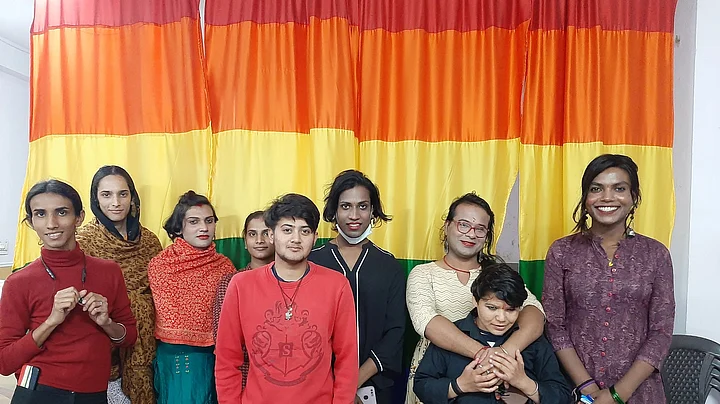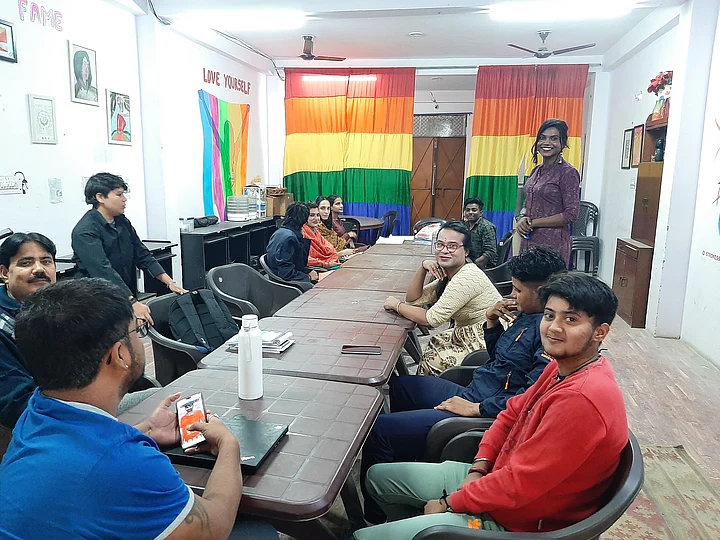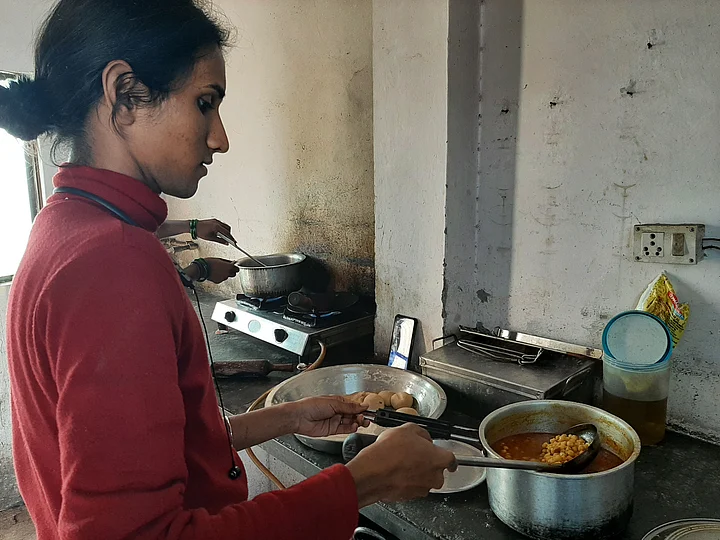At Delhi's Garima Greh – a shelter for transgender persons – almost 25 residents are sitting at a long table in the common room and waiting for lunch at 1:30 pm on Monday, 28 November.
The mental health counsellor at the shelter, Meenakshi (name changed), is cooking chhole and making rotis in the kitchen. "The cook left her job 15 days ago because we couldn't afford to pay her salary. Since then, the staff members have been cooking for the residents," she tells The Quint.
- 01/02
Garima Greh residents and staff pose for a photo as they wait at the lunch table in their common room.
(Photo: The Quint/Saadhya Mohan)

- 02/02
Meenakshi preparing chhole in the kitchen.
(Photo: The Quint/Saadhya Mohan)

The Union Ministry of Social Justice and Empowerment set up 12 Garima Grehs across India after the Transgender Persons (Protection of Rights) Act came into effect in 2020. These shelter homes were opened in 12 different states in 2020-21, with the aim to "provide shelter to destitute and abandoned transgender persons with basic amenities like shelter, food, medical care and recreational facilities," as per the ministry's website.
The shelters, which fall under the ministry's Support for Marginalised Individuals for Livelihood & Enterprise (SMILE) scheme, are also supposed to provide skill development training and rehabilitation to their residents, helping them in seeking dignified employment. Each Garima Greh is run in association with a trans-community-based trust, which is responsible for its day-to-day management.
The Garima Greh guidelines on the Ministry of Social Justice website stipulate that Rs 36,46,500 will be granted to each shelter home per year and will cover the expenses of the rent of the accommodation, food for residents, administrative overheads, and staff salaries.
However, the shelters have allegedly not received the funds promised by the government for this year.
"We have not received any funds from the government for nearly 11 months. We have been managing by taking loans. Now, the landlord of this building has given us a notice, asking us to pay the rent or vacate the space in 15 days. Where will we take our 25 children? Landlords will see our faces and refuse to give us accommodation," Bella Sharma, programme manager at Delhi's Garima Greh, which is located in the Sitapur area, tells The Quint.
This is not the only Garima Greh facing difficulties due to lack of funds.
'Many Residents Have Left, Govt Doesn't Respond': Garima Greh Directors
"The government has not released funds for Garima Grehs since February. The Mumbai Garima Greh has a monthly expense of 3-3.5 lakh. The government gives us Rs 36,00,000 a year. We have been taking loans to sustain ourselves. We have also started a fundraiser now," says Maya Awasthy, who runs the Garima Greh in Mumbai.
"The children who are in Garima Grehs have either run away from their homes or have been made to leave. They can't go back. If proper shelter is not provided to them, they will leave and become vulnerable to begging, violence, and sex work."Maya Awasthy, Project Director of Garima Greh in Mumbai
Ranjita Sinha, project director of the Garima Greh in Kolkata, notes, "Many residents have left us since we cannot provide quality food or training like we are supposed to due to lack of funds. Every day, every bill is a new tension."
"We have tried emailing and calling the government so many times. Either they don't respond, or say that they are monitoring the issue and it will take time," says Sinha.
Each Garima Greh provides a home to 25 unemployed trans persons at a time, as per government guidelines. They can reside at the Greh for up to one year, and usually leave when they find employment to support themselves.
The Quint reached out to the Union Ministry of Social Justice and Empowerment to inquire about the delay in funding for these shelters but has not received a response so far.
'We Are Family': Inside Delhi's Garima Greh, Residents Share Ambitions
At the lunch table in Delhi's Garima Greh, a resident who has finished their meal is feeding their friend.
Manan (name changed) has been staying at the shelter for three months. "I was depressed at my family's house. They didn't understand me, so I kept to my room. Here, I feel accepted. I have made friends and like attending the computer classes," he says.
The residents of the Garima Greh are provided with food, lodging, basic amenities, medical facilities, and counselling. They are also given classes in English and Computers.
Many of them have left their families due to abuse or neglect, and look towards securing a better future for themselves.
"They (Garima Greh) have filled forms for getting an e-rickshaw from the government for me. I will drive an e-rickshaw and become financially independent," says Akshay (name changed), who has been here for nearly seven months.
"I'm preparing for the police exam. Actually, I want to go into the army. But there is no quota for transgender persons in the army. I don't understand why. Humare main poora dum aur jigra hai fauj ke liye (We have all the strength and the courage required for the army). Even if they are not giving me a uniform, I am a fauji by heart," Shashwat asserts.
Shashwat has been at the shelter for 4-5 months. "At my village in Uttar Pradesh, they didn't understand me. They didn't know what being a transgender person meant. Even though I was doing everything well, they kept telling me to be like a girl," he says.
Akshay also directs attention to a wedding turban hanging on the wall in the trans men's dorm.
Not Paid for Months, Staff at Garima Grehs Leaving
While spirits among the residents remain high, the staff at the shelter home shoulder many worries.
Bella Sharma, who was the first resident at Delhi's Garima Greh and is now programme manager, shares that she has not received her salary since August.
"I just got empowered and started earning for myself. Now, if I have financial difficulties, I will again lose all my progress and end up here like I was before. I also need money for hormones. For us, even if we don't get food at a mealtime, it is okay. But hormones are important. They make us feel like ourselves."Bella Sharma, Programme Manager at Delhi Garima Greh
The residents and staff at the Greh have started making potpourri and selling it at exhibitions to cover their personal expenses.
Ranjita Sinha, Project Director at the Garima Greh in Kolkata, shares, "So many of our staff have left because they weren't paid for 7-8 months – security guards, counsellor... We don't even have a program manager anymore. We could not even pay our staff on Diwali or Durga Puja."
"Now, I'm trying to do the work of all the staff which has left. But I don't know how to do some things, like computer work," she adds.
"Our community is very 'jugaadu' resourceful. We are keeping ourselves going with 'jugaad' for now. But we don't know how long it will last," says Sharma.


